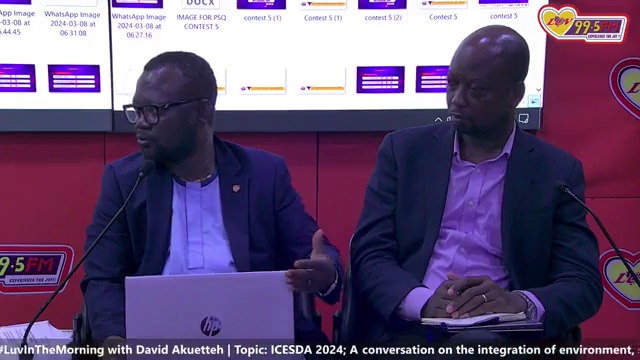Executive Director for the Centre for Business Incubation, Dr Christian Sewordor Mensah, has observed a low enthusiasm in Ghana’s quest to militate against actions that degrade the environment, bringing about a climate crisis.
According to him, the country’s failure to take drastic measures to achieve the 17 Sustainable Development Goals by 2030 could plunge the economy into food insecurity.
Speaking on Luv FM, Dr Mensah emphasised that collective focus and consideration are needed to take proactive measures for environmental progress.
"If we don't take bold and intentional steps to confront the issues that have been identified and categorised as global challenges, we will soon find ourselves without any food to eat due to the adverse effects of the environment," he said.
He observed environmental challenges, such as illegal mining and destruction of wetlands, pose threats to human existence.
“The society could be drained and ultimately face extinction and encounter challenges that can't be quickly resolved, potentially leading to our demise,” he said.
Dr Mensah made the submission ahead of a three-day international conference that would gather stakeholders in academia and industry to delve into pressing matters about the environment and sustainable development in Africa.
The event dubbed ICESDA2024 is on the theme, “Enhancing Environment, Social, Governance and Sustainability for Africa’s Development.”
The maiden edition would see deliberations and recommended solutions to address environmental and climate challenges in Ghana and on the African continent.
Professor De-graft Owusu Manu of the KNUST says the country's attitude and perception in finding pragmatic solutions to tackle environment and climate destruction are not good enough.
“The recent Akosombo water spillage and the illegal mining menace is affecting us badly. We need solutions to solve these problems. If we don’t take action. There’s going to be problems for our future,” he said.
Advocating for a more robust system to fight the climate menace, the Conference Manager for ICESDA2024, Dr Appiah Kenneth, acknowledged that despite the existence of sanitation and environmental laws, their implementations are faced with setbacks.
“There are laws regarding sanitation, but the real issue lies in the enforcement. Enforcing these regulations requires adequate resources because it is not as simple as just implementing laws. We need to provide the necessary resources to empower those responsible for enforcing such laws,” he said.
Latest Stories
-
CAFCC: “Dreams need to score early to unsettle Zamalek” – Former Zamalek striker Felix Aboagye
59 mins -
GHS launches mobile app to counter misinformation about vaccines
1 hour -
Election 2024: Care Ghana warns EC of recruiting political actors as Returning Officers
1 hour -
Mohammed Kudus gets 5th Premier League assist as West Ham hold Liverpool
1 hour -
Religious support source of my success – Asantehene
1 hour -
Sierra Leone energy minister resigns over electricity crisis, as power returns to capital
2 hours -
EC accuses Bright Simons, IMANI Africa of peddling falsehood
2 hours -
GRA/SML contract: Akufo-Addo has whitewashed the KPMG report – Inusah Fuseini
2 hours -
USM Alger receive warm welcome at Oujda Airport ahead of game against RS Berkane
3 hours -
2023/24 Ghana Hockey League to kick-off this weekend
3 hours -
All payments received from our contract with GRA are performance-based, says SML
4 hours -
Marrakech 2024: Ghana’s Zinabu Issah wins gold in women’s discus throw
4 hours -
Our contract with GRA followed due process; ignore contrary reports – SML
4 hours -
SML is just Agyapa in suit and tie – Bright Simons
4 hours -
Domelevo condemns selection of KPMG to audit GRA/SML contract as illegal and unprofessional
4 hours

